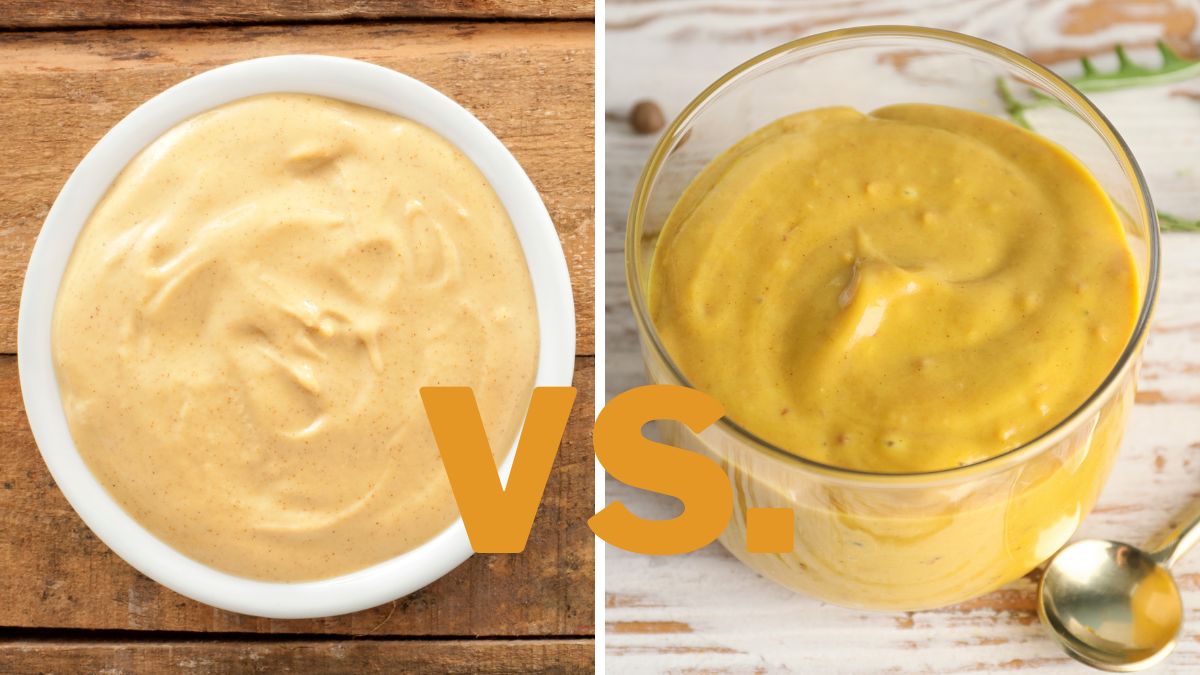Dijon Mustard vs. Honey Mustard: Differences & Which Is Better


I’ve always been a mustard lover. Give me a soft pretzel or a bratwurst, and I’ll slather it in mustard without thinking twice. But when I’m standing in front of the condiment section at the grocery store, I often find myself torn between these two options: Dijon or honey mustard. They seem pretty similar, right? Well, they’re not. So, what are the differences between Dijon and honey mustard?
While Dijon uses white wine for its preparation, honey mustard relies on honey, which makes it sweeter and milder in taste. Also, Dijon is coarse and grainy, while honey mustard is typically smooth. While Dijon is perfect for marinades and sandwiches, honey mustard is used for dippings and glaze for meats.
Both of these are made from mustard seeds and have that familiar tangy, spicy kick. As it turns out, though, they are quite different. From how they’re made to how they taste to what foods they pair best with, these two condiments are more dissimilar than you might expect. You can also scroll down to the table in which you’ll find everything summarized. So which is better: dijon or honey mustard? Let’s investigate.
Differences in Ingredients
Dijon gets its kick from white wine or verjus, the pressed juice of unripe grapes, while honey mustard relies on, you guessed it, honey for sweetness and flavor.
As a result, Dijon has a tangy, spicy quality with citrusy notes, whereas honey mustard is, well, honey-sweet with a milder mustard flavor. Dijon’s ingredients also typically include just mustard seeds, herbs like thyme, and salt.
Honey mustard, on the other hand, contains honey, yellow mustard seeds, vinegar, and spices like turmeric for color. When it comes to heat, Dijon has a kick of heat from the mustard seeds that builds over time, while honey mustard has little to no spiciness due to the honey.
Differences in Preparation
Dijon gets its kick from white wine or vinegar and spices that are added to ground mustard seeds. The seeds are soaked in liquid to activate enzymes that produce compounds called isothiocyanates, giving Dijon its characteristic heat and pungency. The longer the seeds soak, the spicier the final product.
Honey mustard, on the other hand, is sweetened and mellowed. Ground mustard seeds are mixed with honey, vinegar, lemon juice, and sometimes mayonnaise to create a creamy spread. The honey counters the bitterness of the mustard, resulting in a milder, tangy-sweet flavor.
While Dijon can be robust and biting, honey mustard is more subtle and subdued.
Another difference in preparation is the fact that you can make honey mustard out of Dijon, but not vice versa. And check out how easy it is in the video below!
Appearance and Texture
Regarding appearance and texture, Dijon and honey mustard are quite different. Dijon has a coarser, grainier texture from the mustard seeds, while honey mustard is typically smooth.
Dijon mustard gets its grainy, chunky texture from crushing the seeds of brown or black mustard plants. The seeds are soaked in liquid, then crushed, leaving some whole seeds and seed fragments in the final product. In some versions of Dijon, you can actually see and feel the mustard seeds when you spoon it out. This coarseness provides an exciting contrast to its sharp, spicy flavor.
On the other hand, honey mustard has a creamy, velvety smooth texture.
The mustard seeds are ground up into a fine powder during production. Honey, mayonnaise, or other ingredients are then mixed in, creating an emulsion with a consistency similar to salad dressing. The smoothness matches its mildly sweet and tangy taste.
Ultimately, whether you prefer Dijon or honey mustard depends on how much texture you want in your condiment. Dijon’s graininess provides an extra dimension of flavor, while honey mustard’s silkiness lets its sweet and savory flavors shine through.
Taste Profiles
When it comes to taste, Dijon and honey mustard are quite different. As someone who enjoys both, I can tell you Dijon packs more of a tangy, spicy kick from the mustard seeds, while honey mustard has a milder, sweeter flavor from — you guessed it — honey.
Dijon gets its distinctive bold, robust flavor from brown or black mustard seeds. The seeds are crushed and mixed with verjus, the acidic juice of unripe grapes, and various spices like turmeric, giving Dijon its characteristic yellow color and zesty, zingy taste. Dijon is probably for you if you like things on the spicier side with an acidic bite.
Honey mustard, on the other hand, is a blend of mustard and honey, which helps mellow out and balance the bitterness of the mustard seeds. I also love the touch of sweetness that honey adds because it makes the overall flavor more subtle and smooth.
The honey helps round out the edges of the mustard and brings out more of the herbal tones. If you prefer things on the milder, sweeter side, honey mustard may be your jam.
Spiciness Level
Dijon mustard has a kick of heat from mustard seeds and wine, while honey mustard is sweetened with honey, significantly reducing its spiciness.
As for me, I prefer Dijon mustard because I enjoy some heat and zing in my condiments. The spicy flavor of Dijon mustard pairs excellently with hearty sandwiches, sausages, and cheese platters. If I want to tone down the heat for kids or those with sensitive palates, I’ll mix a bit of honey mustard right into the Dijon mustard. This allows me to control the exact spice level to suit different tastes.
For some, honey mustard may be too sweet and lacks the tang they expect from mustard. However, its mild flavor makes it suitable as a dipping sauce for chicken fingers or pretzels or as a glaze or marinade ingredient. When making a honey mustard vinaigrette or marinade, I like to add a bit of Dijon mustard to prevent it from being cloyingly sweet and give it a kick of flavor.
Differences in Uses and Their Substitutes

Dijon mustard is a classic condiment for sandwiches and burgers. Its tangy, spicy flavor pairs well with meats like ham, turkey, and beef. Honey mustard, on the other hand, is too sweet for my taste on most sandwiches. However, honey mustard could work if you have a sweeter sandwich with ingredients like cranberry sauce.
To glaze meats like ham, chicken, or fish, honey mustard is my go-to. Its sweet and tangy flavor creates a delicious crust on the meat. Dijon is too spicy and harsh for most glazes. However, Dijon mustard is ideal when making a marinade, especially for beef. It helps tenderize the meat and infuses tons of flavor. For a sweeter marinade, you can combine Dijon and honey mustard.
Lastly, whether dipping chicken fingers, pretzels, or veggie sticks, honey mustard is the superior dipping sauce; sweet and creamy, it’s perfect for people of all ages. Dijon is too overpowering for most dipping sauces and should be avoided.
When it comes to substitutes, spicy brown mustard or whole grain mustard work well for Dijon mustard.
Honey mustard can be swapped for a mixture of mayonnaise, mustard, and honey. Or, sometimes, I like to combine Dijon mustard, mayonnaise, and a bit of honey to taste — it works like a charm!
Are Dijon Mustard and Honey Mustard Interchangeable?
Not really — while Dijon and honey mustard are made from similar ingredients, the differences in flavor, spiciness, and uses mean they aren’t directly interchangeable. But when in a pinch, you can create substitutes to suit your needs.
Both are commonly used in salad dressings and as salad toppers. Dijon mustard adds a kick of heat and acidity to dressings like vinaigrettes. Honey mustard also makes a popular salad dressing and complements sweeter salads with fruits like apples or berries. I usually use Dijon when making a dressing at home, but bottled honey mustard dressing can work in a pinch for a quicker option.
With the variety of mustards and mustard-based sauces available today, you’re sure to find one that’s just right for any dish.
Choosing one over the other depends on personal taste and what will pair best with your menu. Or create your own custom blend of the two to achieve the ideal balance of sweet and spicy to satisfy your tastes.
So, which of the two is the one for you? Tell me all about your favorite flavor combinations in the comments below!
| Difference | Dijon Mustard | Honey Mustard |
|---|---|---|
| Ingredients & Preparation | Ground mustard seeds are mixed with honey, vinegar, lemon juice, and sometimes mayonnaise | Completely ground brown mustard seeds |
| Appearance & Taste | Has a creamy, velvety smooth texture | Coarse, grainy texture from the mustard seeds, more winey |
| Spiciness Level | Milder, sweeter flavor | A zesty, spicy burst of flavor without too much heat |
| Uses | Glaze meats like ham, chicken, or fish, dipping sauce | Marinades, sauces, dressings, and sandwiches |
